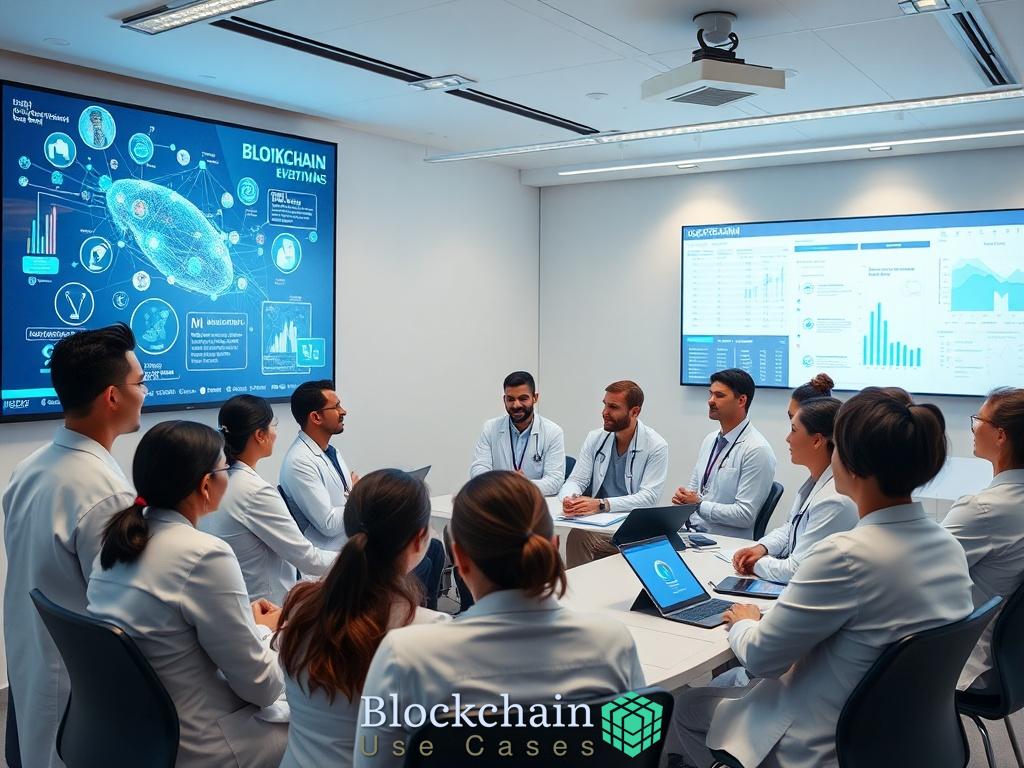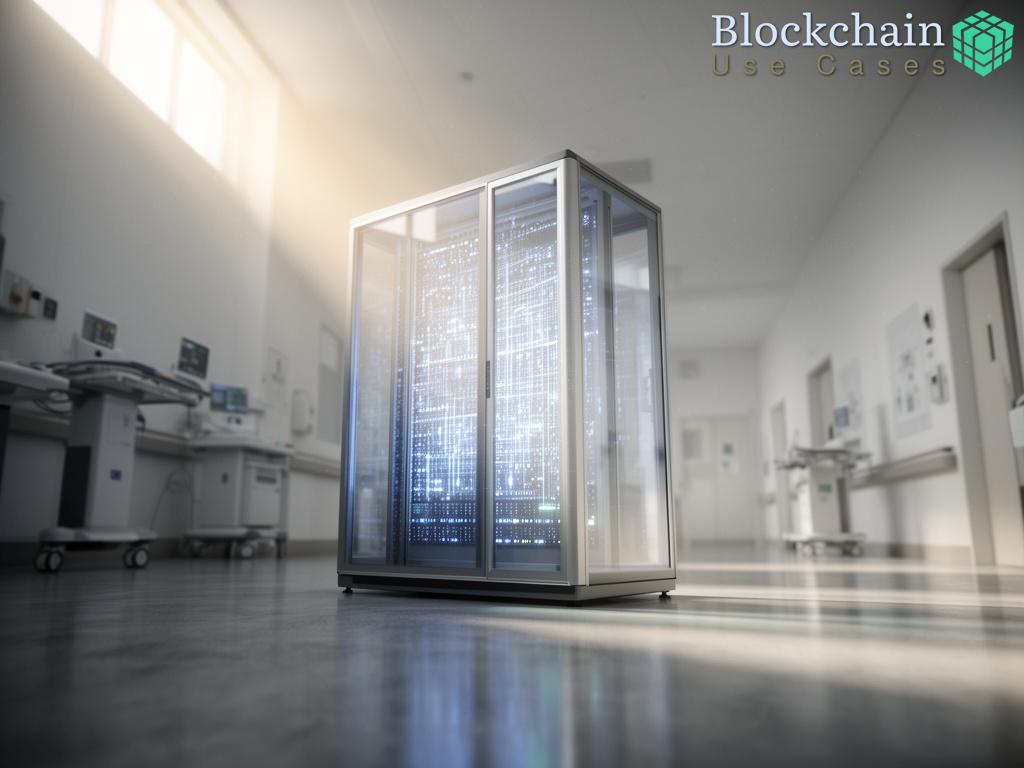The Role of Blockchain in Healthcare Education

Transforming Credentialing Through Decentralization
The healthcare industry is experiencing a paradigm shift, particularly in the realm of continuing education. As professionals seek to stay abreast of the latest medical advancements and regulatory requirements, the necessity for a reliable and secure method to track educational credits has never been more critical. This is where blockchain technology steps in, offering a decentralized solution that can enhance the credentialing process.
Blockchain technology provides a transparent and immutable record of transactions, making it an ideal candidate for managing healthcare education credits. By utilizing blockchain, healthcare professionals can have a secure digital ledger of their qualifications and continuing education credits, accessible anytime and anywhere.
Ensuring Trust and Transparency in Education Records
One of the primary concerns in healthcare education is the authenticity of credentials and the risk of fraud. Traditional systems often rely on centralized databases that can be vulnerable to breaches and manipulation. However, blockchain’s decentralized nature significantly mitigates these risks.
Each educational achievement can be recorded as a unique transaction on the blockchain, creating a tamper-proof record that is verifiable by employers and licensing bodies. This not only enhances trust among stakeholders but also streamlines the verification process, reducing the time and effort required to confirm a professional’s qualifications.
Benefits of Utilizing Blockchain in Healthcare Education:
- Enhanced security and privacy of educational records.
- Reduction in credential fraud.
- Streamlined verification processes for employers and regulators.
- Increased accessibility for healthcare professionals to manage their own credentials.
Fostering a Culture of Lifelong Learning
Blockchain’s potential extends beyond credentialing; it can also foster a culture of continuous improvement in the healthcare sector. By incentivizing ongoing education and training, blockchain platforms can reward professionals for completing courses and acquiring new skills.
Imagine a scenario where healthcare professionals earn tokens for every course they complete, which can then be redeemed for discounts on future training or even converted into currency. This system not only motivates individuals to pursue further education but also creates a community of learners committed to improving patient care.
Benefits of Decentralized Learning for Healthcare Professionals
The healthcare landscape is evolving rapidly, and with this evolution comes the pressing need for healthcare professionals to engage in ongoing education. Decentralized learning platforms offer a variety of advantages that significantly enhance the educational experience for these professionals. By leveraging technology to build a more flexible, accessible, and secure learning environment, decentralized platforms are reshaping how healthcare workers approach their education and credentialing.
Empowering Professionals Through Flexibility
One of the standout features of decentralized education platforms is their ability to provide unparalleled flexibility. Healthcare professionals often juggle demanding schedules filled with patient care, administrative responsibilities, and other commitments. Traditional education models can be rigid, requiring attendance at specific times and locations. In contrast, decentralized platforms allow learners to access courses and materials at their convenience. This flexibility not only helps individuals manage their time more effectively but also encourages a culture of continuous learning as professionals can pursue educational opportunities without the constraints of conventional structures.
Fostering Collaboration and Knowledge Sharing
Decentralized learning environments encourage collaboration among healthcare professionals across various disciplines and geographical locations. By connecting individuals with diverse backgrounds and expertise, these platforms create opportunities for knowledge sharing that enriches the learning experience. For instance, a nurse in a rural area can share insights with a specialist in an urban setting, fostering a rich exchange of ideas and best practices. This collaborative approach not only enhances individual learning outcomes but also contributes to improved patient care as professionals apply new insights gained from their peers.
Cost-Effectiveness and Resource Optimization
Another significant advantage of decentralized education platforms is their potential for cost-effectiveness. Traditional educational programs often come with hefty tuition fees, travel costs, and other expenses that can be prohibitive for many healthcare workers. Decentralized platforms typically reduce these costs by offering more affordable course options and eliminating the need for physical attendance. Additionally, the use of digital resources minimizes the necessity for printed materials, further cutting down on expenses. This financial accessibility ensures that a wider array of professionals can participate in continuous education, ultimately benefiting the healthcare system as a whole.
Challenges in Implementing Decentralized Platforms for CE Credits
The shift towards decentralized platforms for healthcare continuing education (CE) credits promises numerous benefits, yet it also brings forth a set of challenges that stakeholders must navigate. While the advantages of decentralization are compelling, addressing these obstacles is crucial for the successful adoption and integration of these platforms into the healthcare education landscape.
Technical Barriers to Adoption
One of the most significant hurdles in implementing decentralized platforms is the technical complexity involved. Developing a robust and secure blockchain-based system requires substantial expertise in both blockchain technology and healthcare regulations. Many healthcare organizations may lack the necessary technical resources and knowledge to build or integrate such systems effectively. Furthermore, ensuring interoperability between existing systems and new decentralized platforms can pose an additional challenge. Without seamless integration, healthcare professionals may find it difficult to transition their educational records, which can lead to frustration and resistance to adopting new technologies.
Regulatory and Compliance Concerns
As decentralized platforms emerge, they must navigate a complex landscape of regulatory frameworks that govern healthcare education. Different jurisdictions may have varying requirements for credentialing and documentation, which can complicate the implementation of a standardized decentralized solution. Additionally, concerns regarding data privacy and security are paramount, given the sensitive nature of healthcare information. Regulatory bodies will need to establish guidelines that address these concerns while fostering innovation. The potential for varying interpretations of regulations across different regions may also result in inconsistencies that hinder the widespread adoption of decentralized platforms.
Moreover, the lack of established best practices for utilizing blockchain in healthcare education can lead to uncertainty among stakeholders. As the technology is still relatively new, creating a cohesive framework that addresses these regulatory challenges will be essential for ensuring trust and compliance.
Building Stakeholder Trust and Engagement
Establishing trust and engagement among stakeholders is also critical for the success of decentralized platforms. Healthcare professionals, educational institutions, and regulatory bodies must all be convinced of the benefits and reliability of these systems. This necessitates comprehensive outreach and education about how decentralized platforms work, their advantages, and the safeguards in place to protect sensitive information. If stakeholders do not feel confident in the security and efficacy of these platforms, their willingness to adopt and utilize them will be significantly diminished.
Addressing these challenges requires a collaborative effort among technology developers, healthcare providers, and regulatory bodies. By fostering an environment of open communication and shared goals, stakeholders can work together to create solutions that not only enhance healthcare education but also build a sustainable ecosystem for ongoing learning and professional development.
Regulatory Considerations for Decentralized Education in Healthcare
Understanding the Regulatory Framework
The integration of decentralized platforms in healthcare continuing education is not without its complexities, particularly concerning regulatory compliance. As healthcare education evolves, it is imperative for stakeholders to comprehend the intricate web of regulations that govern these platforms. The need for a harmonious balance between innovation and regulation is paramount, ensuring that healthcare professionals can safely and effectively utilize decentralized education without compromising the integrity of their credentials.
Key Regulatory Challenges to Address
As organizations and institutions explore the potential of decentralized education platforms, several regulatory challenges must be tackled to facilitate successful implementation. These challenges include:
- Data Privacy Regulations: With sensitive healthcare information at stake, adherence to data protection laws such as HIPAA in the United States and GDPR in Europe is crucial. Ensuring that decentralized platforms safeguard personal information while allowing for seamless access to educational records is a primary concern.
- Credentialing Standards: Different states and countries have unique requirements for credentialing healthcare professionals. Establishing a standardized approach that recognizes decentralized education credits across jurisdictions will be essential for fostering trust among stakeholders.
- Certification and Accreditation: Regulatory bodies must evaluate and approve the courses offered through decentralized platforms to ensure they meet established educational standards. The absence of recognized accreditation could undermine the value of these educational offerings.
Building a Collaborative Framework for Compliance
To navigate the regulatory landscape effectively, a collaborative framework involving all stakeholders is essential. Engaging healthcare providers, educational institutions, and regulatory agencies in dialogue will foster understanding and facilitate the development of best practices. This collaboration could take the form of:
- Establishing Clear Guidelines: Regulatory bodies should work to create explicit guidelines that clarify the requirements for decentralized education, addressing concerns related to data privacy, accreditation, and credentialing.
- Creating Pilot Programs: Implementing pilot programs can provide valuable insights into the practical implications of decentralized learning, helping to identify potential regulatory hurdles and solutions before widespread adoption.
- Continuous Monitoring and Adaptation: As the landscape of healthcare education continues to evolve, ongoing assessment and adjustment of regulations will be necessary to keep pace with technological advancements.
By embracing a proactive approach to regulatory considerations, the potential of decentralized platforms in healthcare continuing education can be fully realized, paving the way for a more accessible, flexible, and secure learning environment for healthcare professionals.
Future Trends in Decentralized Healthcare Education Systems
The evolution of decentralized platforms for healthcare continuing education credits is poised to redefine the educational landscape significantly. As technology advances, these platforms will not only enhance accessibility but also transform the way healthcare professionals engage with their learning processes. The trends emerging within this domain reveal a future where decentralized education becomes more immersive, personalized, and integrated into the fabric of healthcare delivery.
Integration of Artificial Intelligence in Learning Pathways
In the coming years, we can expect the integration of artificial intelligence (AI) into decentralized education systems to create more tailored learning experiences for healthcare professionals. AI algorithms will analyze individual learning patterns and preferences, allowing for the development of customized educational pathways that cater to each learner’s unique needs. This personalized approach not only enhances engagement but also ensures that professionals acquire the competencies necessary to excel in their respective fields.
Moreover, AI can facilitate real-time assessments and feedback, enabling healthcare workers to monitor their progress continuously. Such advancements will empower professionals to make informed decisions about their educational journeys, ultimately leading to improved patient outcomes as they apply newly acquired knowledge and skills in practice.
Gamification and Incentivization of Education
Another trend on the horizon is the increased use of gamification within decentralized learning environments. By incorporating game-like elements such as point systems, leaderboards, and challenges, these platforms can motivate healthcare professionals to engage more deeply with their education. This interactive approach fosters a sense of competition and achievement, encouraging continuous learning and skill development.
Incentivization mechanisms, such as earning tokens for completing courses, will become more prevalent, allowing professionals to redeem rewards that can be utilized for future educational opportunities. This not only enhances participation rates but also contributes to a culture of lifelong learning, where healthcare workers actively seek to broaden their knowledge and improve their practice.
Interoperability and Standardization Across Platforms
As decentralized education systems continue to proliferate, the need for interoperability among various platforms will become increasingly critical. Ensuring that different decentralized systems can communicate and share information seamlessly will promote a more cohesive learning environment. This trend will necessitate the establishment of industry-wide standards that govern credentialing, course offerings, and verification processes.
Standardization will not only enhance trust among stakeholders but also facilitate the recognition of educational credits across different jurisdictions. As healthcare professionals navigate a complex regulatory landscape, having a unified framework will streamline their ability to obtain and verify credentials, thereby reinforcing the credibility of decentralized education systems.





